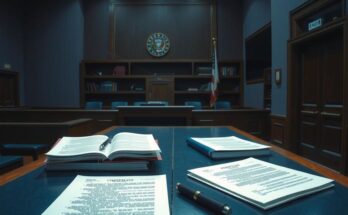Tunisian authorities have undermined the upcoming presidential election by altering electoral laws, largely nullifying judicial oversight and enabling the exclusion and imprisonment of opposition candidates, amidst broader crackdowns on dissent and media. This strategic repression compromises the democratic integrity essential for free elections.
Tunisian authorities have significantly compromised the integrity of the presidential election scheduled for October 6, 2024, through recent amendments to the electoral law, as reported by Human Rights Watch. These changes, enacted just days before the election, have permitted the exclusion and arrest of opposition candidates while enacting arbitrary measures against political detractors and civil entities. On September 27, the Assembly of the Representatives of the People approved new regulations that revoked the Administrative Court’s jurisdiction over electoral issues, essentially nullifying its role as a safeguard against electoral malpractices. This legislative shift follows the mass detainment of over 170 individuals in Tunisia, many of whom are linked to the Ennahda opposition party, and represents a broader clampdown on dissent, independent media, and civic engagement. Human Rights Watch’s deputy director for the Middle East and North Africa, Bassam Khawaja, stated, “Tunisian authorities are systematically placing obstacle after obstacle in the way of a fair election and opposition candidates being able to campaign for president freely.” The recent legal amendments designate the Tunis Court of Appeal as the sole adjudicator of electoral disputes, effectively precluding other judicial entities from addressing issues regarding the presidential election scheduled for 2024. This action was taken promptly after the Administrative Court reaffirmed the eligibility of certain excluded candidates, prompting authorities to continue with their restrictive actions, resulting in the official launch of the election campaign with merely three candidates. The crackdown on political opposition has intensified, particularly towards members and supporters of the Ennahda party, with hundreds arrested in recent weeks. Notably, Ayachi Zammel, a candidate who had received preliminary approval, has been imprisoned under dubious charges of forgery related to his candidacy. The authorities have escalated their hostility towards civil society organizations as well. Notably, the electoral commission, comprehensively restructured by President Kais Saied, has denied accreditation to respected watchdogs such as I Watch and Mourakiboun, citing unsubstantiated claims of foreign interference. Additionally, the media landscape in Tunisia is experiencing escalating restrictions, with several outlets targeted for prosecution under the guise of safeguarding the electoral commission’s image and authority. Tunisia’s obligations under the International Covenant on Civil and Political Rights, requiring the assurance of free electoral participation unmarred by political discrimination, remain unaddressed as these events unfold. Human Rights Watch has called on Tunisian authorities to cease their repressive measures and enable a democratic electoral environment.
The political landscape in Tunisia has faced increasing tension since the 2011 uprisings that commenced the Arab Spring. Following years of democratic experimentation, the country has recently been critiqued for reverting to authoritarianism, particularly under the leadership of President Kais Saied. This centralization of power has manifested in systematic undermining of civil liberties, repression of political dissent, and the manipulation of electoral processes. The implications of these actions not only threaten the structure of democratic governance in Tunisia but also violate international human rights obligations inherent to free election practices.
The series of legislative changes and actions taken by the Tunisian authorities ahead of the October 2024 presidential election constitute a concerted effort to undermine the electoral process and repress dissent. The disbandment of judicial oversight, mass arrests of political opponents, and restrictions on civil society highlight an alarming trend towards authoritarianism. This environment poses a significant threat to the democratic integrity of the upcoming elections and reveals a broader disregard for fundamental human rights and freedoms in Tunisia.
Original Source: www.hrw.org




